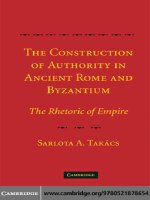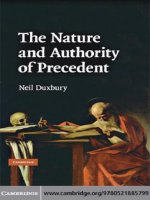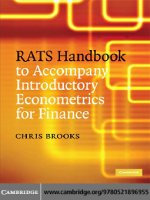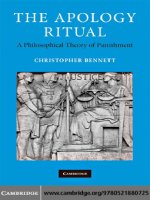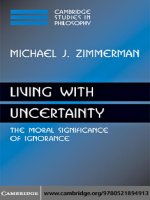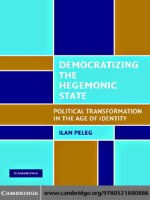cambridge university press counter democracy politics in an age of distrust dec 2008 kho tài liệu bách khoa
Bạn đang xem bản rút gọn của tài liệu. Xem và tải ngay bản đầy đủ của tài liệu tại đây (1.16 MB, 350 trang )
This page intentionally left blank
Counter-Democracy
Democracy is established as a generally uncontested ideal, while regimes
inspired by this form of government fall under constant criticism hence
the steady erosion of confidence in representatives that has become
one of the major political issues of our time. Amidst these challenges,
the paradox remains that, while citizens are less likely to make the trip to
the ballot box, the world is far from entering a phase of general political
apathy. Demonstrations and activism abound in the streets, in cities
across the globe, and on the internet. Pierre Rosanvallon analyzes the
mechanisms used to register a citizen’s expression of confidence
or distrust, and then focuses on the role that distrust plays in democracy
from both a historical and theoretical perspective. This radical shift in
perspective uncovers a series of practices surveillance, prevention, and
judgment through which society corrects and exerts pressure. The
Seeley Lectures are established as a unique forum to promote the finest
political thought of our time, and Counter Democracy is a powerful
and provocative addition to this distinguished series.
pierre rosanvallon is Professor and Chair of Modern and
Contemporary Political History at the Collège de France. He is also
professor at the École des Hautes Études en Sciences Sociales as well as
the President of the international intellectual workshop “La République
des idées.”
a rthur goldhammer, a translator specializing in French history,
literature, philosophy, and social science, has translated more than a
hundred works by many of France’s most noted authors. He is on the
editorial board of the journal French Politics, Culture and Society, and
in 1996 was named Chevalier de l’Ordre des Arts et des Lettres by the
French Minister of Culture.
The John Robert Seeley Lectures have been established by the University
of Cambridge as a biennial lecture series in social and political studies,
sponsored jointly by the Faculty of History and the University Press.
The Seeley Lectures provide a unique forum for distinguished scholars
of international reputation to address, in an accessible manner, themes
of broad and topical interest in social and political studies. Subsequent
to their public delivery in Cambridge the University Press publishes
suitably modified versions of each set of lectures. Professor James Tully
delivered the inaugural series of Seeley Lectures in 1994 on the theme of
Constitutionalism in an Age of Diversity.
The Seeley Lectures include
(1)
Strange Multiplicity: Constitutionalism in an Age of Diversity
james tully
isbn 978 0 521 47694 2 (paperback)
Published 1995
(2) The Dignity of Legislation
jeremy waldron
isbn 978 0 521 65092 2 (hardback) 978 0 521 65883 6 (paperback)
Published 1999
(3) Woman and Human Development: The Capabilities Approach
martha nussbaum
isbn 978 0 521 66086 0 (hardback) 978 0 521 00385 8 (paperback)
Published 2000
(4) Value, Respect and Attachment
joseph raz
isbn 978 0 521 80180 5 (hardback) 978 0 521 00022 2 (paperback)
Published 2001
(5)
The Rights of Others: Aliens, Residents, and Citizens
seyla benhabib
isbn 978 0 521 83134 5 (hardback) 978 0 521 53860 2 (paperback)
Published 2004
(6) Laws of Fear: Beyond the Precautionary Principle
cass r. sunstein
isbn 978 0 521 84823 7 (hardback) 978 0 521 61512 9 (paperback)
Published 2005
(7) Counter Democracy: Politics in an Age of Distrust
pierre rosanvallon
isbn 978 0 521 88622 2 (hardback) 978 0 521 71383 2 (paperback)
COUNTER-DEMOCRACY
Politics in an Age of Distrust
PIERRE ROSANVALLON
Collège de France
Translated by
ARTHUR GOLDHAMMER
Harvard University
CAMBRIDGE UNIVERSITY PRESS
Cambridge, New York, Melbourne, Madrid, Cape Town, Singapore, São Paulo
Cambridge University Press
The Edinburgh Building, Cambridge CB2 8RU, UK
Published in the United States of America by Cambridge University Press, New York
www.cambridge.org
Information on this title: www.cambridge.org/9780521886222
© Cambridge University Press 2008
This publication is in copyright. Subject to statutory exception and to the
provision of relevant collective licensing agreements, no reproduction of any part
may take place without the written permission of Cambridge University Press.
First published in print format 2008
ISBN-13
978-0-511-46360-0
eBook (EBL)
ISBN-13
978-0-521-88622-2
hardback
ISBN-13
978-0-521-71383-2
paperback
Cambridge University Press has no responsibility for the persistence or accuracy
of urls for external or third-party internet websites referred to in this publication,
and does not guarantee that any content on such websites is, or will remain,
accurate or appropriate.
contents
Foreword by Gareth Stedman Jones
Introduction
Part 1
[1]
Overseeing democracy
[29]
1 Vigilance, denunciation, evaluation
2 The overseers
[ix]
[33]
[57]
3 The thread of history
[76]
4 Legitimacy conflicts
[104]
Part 2 The sovereignty of prevention
5 From the right of resistance to complex
sovereignty [125]
6 Self-critical democracies
7 Negative politics
Part 3
[150]
[173]
The people as judge
8 Historical references
9 Almost legislators
[195]
[214]
10 The preference for judgment
vii
[191]
[227]
[121]
contents
Part 4
Unpolitical democracy
[249]
11 The sense of powerlessness and symbols of
depoliticization [253]
12 The populist temptation
[265]
13 Lessons of unpolitical economy [274]
14 Conclusion: the modern mixed regime
Index
viii
[319]
[290]
foreword
This book is based upon the Seeley Lectures delivered in
Cambridge in 2006. Pierre Rosanvallon, who is a Professor,
both at the Collège de France and at the Raymond Aron Centre
for Political Research in Paris, has attracted much attention in
France and elsewhere for his work on the intellectual history of
French politics since the Revolution, on contemporary questions of social justice, and on the definition and trajectory of
modern democracy. His historical studies of French politics,
incorporating a fundamental and pioneering re-evaluation
of French liberalism, include Le Moment Guizot (1985). His
examination of contemporary problems of social justice is
most powerfully represented by La Nouvelle Question sociale:
Repenser L’État-providence (1995), which was translated into
English in 2000 as The New Social Question: Rethinking the
Welfare State. His third area of concern, work most relevant to
the present volume, has focused upon the intellectual history
of democracy in France. This has been published as a trilogy:
Le Sacre du citoyen: Histoire du suffrage universel en France
(1992); Le Peuple introuvable: Histoire de la représentation
démocratique en France (1998); and La Démocratie inachevée:
Histoire de la souveraineté du peuple en France (2000).
Rosanvallon believes that there are significant differences between American and European conceptions of democracy, dating back to the second half of the nineteenth century.
In the United States, democracy has been viewed from a
ix
foreword
globally fundamentalist perspective and treated as a unique,
universal, and intrinsically good political form, destined to
spread throughout the world, once offered to its different
peoples. This has been a vision not only articulated in works
of political science, but also tirelessly preached by successive
American presidents from Woodrow Wilson and Franklin
Roosevelt to J.F. Kennedy and George W. Bush. In this utopian
and quasi-religious perspective, the supposed ethos and institutional form of democracy has remained relatively constant
and uniform. So has the political ambition: to ensure a concordance between political practice and this pre-formulated democratic norm, and to further its diffusion throughout the world.
But such an approach has been beset by increasing
pessimism. It has found itself confronted by an intractable set
of problems, creating an apparently unbridgeable gap between
the democratic ideal and a discouraging political reality.
Numerous studies have lamented an endemic distrust of
politicians, low levels of electoral participation, the decline of
political parties, and widespread political apathy or passivity.
In Europe, by contrast, conceptions of democracy and
expectations of its progressive improvement have from the
beginning been more realistic and low-key. ‘Real democracies,’
Rosanvallon notes, have always involved ‘tension and conflict.’
The problem with the conventional notion of democracy,
he thinks, is that it elides questions of legitimacy (abiding by
the procedural rules of democratic representation) with questions of trust (the assumption that politicians will act for the
common good). But according to Rosanvallon, not only is any
convergence between legitimacy and trust ever more than
purely temporary, but durable forms of distrust have been an
x
foreword
inherent component of all democracies, however legitimate.
Therefore his alternative conception of democracy encompasses not only the formal, legal, and constitutional practices
of democratic regimes, but also all those limiting and corrective devices – whether constitutional or extra-constitutional,
including those which date from pre-democratic epochs – by
which the people have attempted to impose control over the
political processes carried out in their name. This is what
Rosanvallon calls ‘counter-democracy’.
Rosanvallon believes that conventional definitions of
democracy, which restrict it to the electoral process, are too
narrow. A more adequate account would include the various
ways in which the people are able to check or hold to account
their representatives or the government, irrespective of the
electoral process. In particular, he picks out for detailed discussion three ways in which distrust may be expressed: powers
of oversight or ‘surveillance,’ forms of prevention, and the
testing of judgments.
Conceived in this way, democracy, or rather the forms,
which Rosanvallon assembles together as ‘counter-democracy,’
can be said to possess a history much longer and more multifaceted than that recognized by conventional democratic theorists. For such a history can include practices which enforce
forms of popular control or veto, ancient as well as modern,
extra-European as well as western. Such an approach also makes
possible a more optimistic account of contemporary democracy
than that found in many English-speaking accounts. For it
suggests that a citizenry may be no less (or more) active than
before, simply that it has chosen to exercise these ‘counterdemocratic’ powers in different and less familiar ways.
xi
foreword
But, as Rosanvallon concedes, there are also dangers
in this account. Although the modern citizen may not be as
‘passive’ as the conventional account maintains, Rosanvallon
accepts that levels of political distrust have increased, especially in relation to scientific expertise or economic forecasting, and that there now exists a great distance between civil
society and political institutions. It is a situation in which
there is a heightened danger of the unwanted appearance of
all sorts of populism. Furthermore, if the price of enlarging
the contemporary definition of democracy is to accord to all
forms of ‘counter-democracy’ – whether institutional or extrainstitutional – the status of ‘an authentic political form,’ it is
difficult to see how such populism could be excluded from a
recognized place in the formal political system.
How effectively Rosanvallon deals with this difficulty
is for the reader to judge. Clearly, the implications of some of
Rosanvallon’s arguments are controversial, but that is only to
be expected of an arresting and original approach to the understanding of contemporary political life and of a more positive
conception of the prospects of political change.
Gareth Stedman Jones
xii
Introduction
The democratic ideal now reigns unchallenged, but regimes
claiming to be democratic come in for vigorous criticism
almost everywhere. In this paradox resides the major political
problem of our time. Indeed, the erosion of citizens’ confidence in political leaders and institutions is among the
phenomena that political scientists have studied most intently
over the past twenty years. National and comparative research
has yielded a clear diagnosis. The literature on voter abstention is also abundant. Significantly, even the newest democracies suffer from this affliction, as a glance at the formerly
Communist countries of Eastern Europe and the erstwhile
dictatorships of Asia and Latin America shows. How are we to
understand this situation, which has been variously described as
a “crisis,” a “malaise,” a “disaffection,” and a “breakdown”?
Most explanations invoke a series of factors, including the rise
of individualism, anxious retreat into the private sphere,
decline of political will, and rule by elites increasingly cut off
from the broader public. We hear frequently about the “decline
of politics,” and blame is said to lie with rulers who cannot see
or abdicate their responsibilities as well as with people who
have become discouraged by or indifferent to the political.
Something is missing, critics say; something has gone wrong.
Today’s democracies have somehow deviated from an original
model, somehow betrayed their original promise. Such judgments are commonplace nowadays: a bleak or bitter appraisal
1
counter-democracy
of the present is linked to nostalgia for a largely idealized civic
past. In some cases what emerges from these expressions of
disappointment is a muted or partially concealed hatred of
democracy.
This work takes a different approach to understanding
the current state of democracies. In particular, I propose to
expand the scope of analysis by attending to the ways in which
different societies have responded to the dysfunctions of representative regimes. Historically, the rise of democracy has
always represented both a promise and a problem: a promise
insofar as democracy reflected the needs of societies founded
on the dual imperative of equality and autonomy; and a problem, insofar as these noble ideals were a long way from being
realized. Wherever democracy was tried, it remained incomplete – in some places grossly perverted, in others subtly
constricted, in still others systematically thwarted. In a sense,
there has never been a fully “democratic” regime, if we take the
word in its fullest sense. Actual democracies have failed to
develop as fully as they might have done, and some have been
snuffed out. Thus disappointment has always coexisted with
the hope of liberation from dependence and despotism. The
idea of basing the legitimacy of government on election has
nearly always gone hand-in-hand with citizen mistrust of the
powers-that-be. The famous “Agreement of the Free People of
England,” published in London on May 1, 1649, was the first
modern democratic manifesto, yet already we can see a duality
of trust and distrust in its text. Guarantees of civil and religious
liberties, trial by jury, universal suffrage, limited terms of
office, strict subordination of the military to the civilian
powers, and universal access to public office – all the principles
2
introduction
on which the revolutions of the seventeenth and eighteenth
centuries would thrive can be found here. Significantly, however, the document also refers to the “woeful experience” of
corruption, to the risk that special interests might, in spite of all
precautions, seize power and turn representative government
to domination of a novel sort. Thus, even as the terms of
legitimate government were set forth, a “reserve of mistrust”
found expression in the same breath.
The society of distrust
The history of real democracies has always involved
tension and conflict. Thus legitimacy and trust, which the
theory of democratic-representative government has tried
to link through the electoral mechanism, are in fact distinct.
These two political attributes, which are supposedly fused in
the ballot box, are actually different in kind. Legitimacy is a
juridical attribute, a strictly procedural fact. It is a pure and
incontestable product of voting. Trust is far more complex. It is
a sort of “invisible institution,” to borrow a well-known formula from the economist Kenneth Arrow.1 Its functions are
at least three in number. First, it represents an expansion of
legitimacy, in that it adds to a mere procedural attribute both a
moral dimension (integrity in the broadest sense) and a substantive dimension (concern for the common good). Trust also
plays a temporal role: it implies that the expansion of legitimacy continues into the future. Thus Simmel observed that
1
See Kenneth J. Arrow, The Limits of Organization (New York: Norton,
1974), p. 26.
3
counter-democracy
trust is essentially “an hypothesis about future behavior.”2
Finally, trust is an institutional economizer, in that it eliminates
the need for various procedures of verification and proof. The
gap between legitimacy and trust has been a central problem in
the history of democracy. The existence of such a gap has been
the rule, its elimination the exception. (One sometimes speaks
of a “state of grace” to describe the brief period following an
election, during which the two attributes merge into one, but
this is an exception.) In reaction to this general situation,
democracies have developed in two directions. First, a variety
of measures have been proposed to strengthen the constraints
of procedural legitimacy. For instance, the frequency of elections has been increased, and various schemes of direct
democracy have been employed to limit the independence of
elected representatives. What all these initiatives have in common is that they seek to improve the quality of “electoral
democracy.” At the same time, however, a complex assortment
of practical measures, checks and balances, and informal as
well as institutional social counter-powers has evolved in order
to compensate for the erosion of confidence, and to do so by
organizing distrust. It is impossible to theorize about democracy or recount its history without discussing these organized
forms of mistrust.
2
George Simmel, Sociologie: Études sur les formes de la socialisation (Paris:
Presses Universitaires de France, 1999), pp. 355 356. He writes: “Certain
enough to furnish the basis of practical action, trust is also an intermediate
state between knowledge and ignorance of others. A person who knows
everything has no need of trust. One who knows nothing cannot
reasonably bestow his trust.”
4
introduction
If we wish to comprehend the variety of democratic
experiences, we must therefore consider two aspects of the
phenomenon: the functions and dysfunctions of electoralrepresentative institutions on the one hand and the organization of distrust on the other. Until now, historians and political
theorists have been primarily concerned with the first aspect.
I myself have explored this dimension of the problem in a series
of works on the institutions of citizenship, representation, and
sovereignty.3 Now it is time to explore the second dimension.
To be sure, various expressions of democratic distrust have
been treated in any number of monographs dealing with subjects such as the history of resistance to the extension of public
power and the reactions such resistance provoked, or the
sociology of forms of civic disaffection and rejection of the
political system. Various specific forms of action and particular attitudes have thus come in for careful scrutiny, but these
have never been combined in a more general framework, apart
perhaps from some very broad and quite vague attempts to
view these phenomena in the context of the struggle for a freer,
more just world. In this work, by contrast, I propose to view
the manifold manifestations of mistrust in a comprehensive
framework in order to bring out in a systematic and coherent
way the most profound characteristics of the phenomenon.
In short, I wish to understand the manifestations of mistrust
as elements of a political system. I further intend to use this as
3
See my trilogy Le Sacre du citoyen: Histoire du suffrage universel en France
(Paris: Gallimard, 1992); Le Peuple introuvable: Histoire de la
représentation démocratique en France (Paris: Gallimard, 1998); La
Démocratie inachevée: Histoire de la souveraineté du peuple en France
(Paris: Gallimard, 2000).
5
counter-democracy
the basis for a broader understanding of how democracies
work and a deeper knowledge of the history and theory of
democracy.
In order to place the problem in its proper context,
I should first point out that the expression of distrust took two
main forms: liberal and democratic. Liberal distrust of power
has often been theorized and commented on. Montesquieu
gave it its canonical expression,4 and the Founding Fathers of
the American regime gave it constitutional form. Throughout
the period during which the American Constitution was
debated, Madison was obsessed with the need to prevent the
concentration of power. His goal was not to establish a good
strong government based on the confidence of the people; it
was rather to constitute a weak government in which suspicion
would be institutionalized. It was not to crown the citizen but
to protect the individual from the encroachments of public
authority.
In France, men like Benjamin Constant and the economist Jean Sismondi, who was also one of the leading political
theorists of the early nineteenth century, took similar positions. For Sismondi, the cornerstone of every liberal regime
was “the constant disposition to resistance.”5 For these writers,
4
5
Recall the formulation in De l’esprit des lois, book XI, chap. 4 (1758): “It is
an eternal experience that any man who wields power is likely to abuse
it; he will proceed until he encounters limits. Who would have guessed?
Even virtue needs limits. If power is not to be abused, things must be
arranged so that power checks power.”
See Jean Charles Léonard Simonde de Sismondi, Études sur les
constitutions des peuples libres (Brussels, 1836), p. 230: “All institutions
must be placed under the guarantee of this disposition.”
6
introduction
the memory of the ancien régime was decisive. They sought to
block any possible return to despotism. Hence more democracy automatically meant greater suspicion of governmental
power.6 Similarly, Benjamin Constant went so far as to argue
that liberty depends on the public’s systematic opposition
to the agents of government. He even spoke of the need for
“surveillance in hatred.”7 His true originality lay elsewhere,
however: he was the first to distinguish clearly between an
“ancient” form of distrust deriving from a refusal to accept
the imposition of arbitrary powers on society and a “modern”
form stemming from the recognition that even new regimes
based on the general will could go astray. Pointing to the
“terrifying example” of Robespierre, he noted that France
had been shattered in 1793 when “universal trust” in the political process “brought respected men into administrative positions,” yet those same men “allowed murderous groups to
organize.”8 He therefore argued that limits had to be placed
on democratic confidence itself. In 1829, shortly before the
charter of the parliamentary monarchy established a regime
of the type he had always favored, he praised the proposed
text by asserting bluntly that “every [good] constitution is an
act of distrust.”9 Liberal distrust can be seen as a form of
“preventive power,” to borrow an expression of Bertrand de
6
7
8
9
See Mark E. Warren’s introduction to Democracy and Trust (Cambridge
University Press, 1999).
Benjamin Constant, De la force du gouvernement actuel de la France et de
la nécessité de s’y rallier ([Paris], 1796), p. 66.
Ibid., p. 67.
Courrier français, November 5, 1829, in Benjamin Constant, Recueil
d’articles, 1829 1830 (Paris: Champion, 1992), p. 53.
7
counter-democracy
Jouvenel’s.10 It therefore belongs with an anxious and pessimistic view of democracy. Distrust here takes the form of
suspicion of the power of the people, fear of its expression,
and doubts about universal suffrage.
The second type of distrust can be called democratic.
Its purpose is to make sure that elected officials keep their
promises and to find ways of maintaining pressure on the
government to serve the common good. In this book I shall
be concerned with democratic distrust, which is the primary
form of distrust in the post-totalitarian era. Democratic distrust can be expressed and organized in a variety of ways, of
which I shall emphasize three main types: powers of oversight,
forms of prevention, and testing of judgments. Operating
within electoral-representative democracy, these three counterpowers describe the broad outlines of what I propose to
call counter-democracy. By “counter-democracy” I mean not
the opposite of democracy but rather a form of democracy that
reinforces the usual electoral democracy as a kind of buttress, a
democracy of indirect powers disseminated throughout society – in other words, a durable democracy of distrust, which
complements the episodic democracy of the usual electoralrepresentative system. Thus counter-democracy is part of a
larger system that also includes legal democratic institutions.
It seeks to complement those institutions and extend their
influence, to shore them up. Hence counter-democracy should
be understood and analyzed as an authentic political form,
which it is the purpose of this book to describe and evaluate.
10
Bertrand de Jouvenel, “The Means of Contestation,” Government and
Opposition 1, no. 2 (Jan. 1966).
8
introduction
The democratic form of political distrust is especially
important because of the erosion of trust in contemporary
society. Three factors – scientific, economic, and sociological –
account for the rise of the society of distrust. Ulrich Beck has
shed much light on the scientific factor in his book on “the risk
society.”11 He begins from the banal observation that people
ceased to feel optimistic about the promise of technology in
the 1960s. In the current age of catastrophe and uncertainty,
modern industry and technology tend to be associated more
with risk than with progress. The risk society is by its very
nature wary of the future, yet its citizens are still obliged to
place their trust in scientists because they cannot weigh the
relevant issues without the aid of specialists. Thus the role of
scientists is as problematic as it is indispensable, and this is
a source of resentment. Citizens have no alternative but to
oblige scientists to explain their thinking and justify their
actions. The strategy is thus one of institutionalizing distrust
in a positive way, so as to serve as a kind of protective barrier, a
guarantee of the interests of society. Beck’s critics have called
attention to the paradoxical nature of this strategy: “The citizen who wishes to resolve problems that specialists were able
neither to foresee nor to avoid finds himself once again at their
mercy. His only option is to continue to delegate authority to
specialists while at the same time searching for new ways to
monitor and oversee their work.”12 Thus progress in science
11
12
Ulrich Beck, La Société du risque: Sur la voie d’une autre modernité (Paris:
Aubier, 2001).
Michel Callon, Pierre Lascoumes, and Yannick Barthe, Agir dans un
monde incertain: Essai sur la démocratie technique (Paris: Éditions du
Seuil, 2001), p. 311.
9
counter-democracy
and technology has given rise to specific forms of social
distrust. The “precautionary principle” is often invoked in
this connection, but the term only partially succeeds in capturing the complexity of the phenomenon (which bears some
similarity to the liberal notion of checks and balances in the
political domain).
Confidence in macroeconomic management has also
waned. If macroeconomics is a science concerned with predicting future behavior, there is no denying that our ability to
make economic forecasts has diminished. Medium- and longterm predictions can no longer be relied on, either because the
responsible agencies no longer have the technical means to
issue them or have been mistaken so often in the past that they
have lost all credibility. In France the legislature used to vote
on what rate of economic growth it wished to achieve over the
next five years. The very idea of setting the growth rate by
legislative fiat now seems hopelessly outdated, yet it was a
common practice just thirty years ago, when economic planning was still a recognized prerogative of government, at least
in France. Today’s economy, both more open to the world
and more complex than yesterday’s, seems far less predictable.
Attitudes toward economic forecasting therefore reflect growing distrust as well, and this distrust is amplified by a widespread belief that public policy cannot do much about the
economy in any case.
In addition to scientific and economic reasons for
distrust, social changes have also heightened suspicion of
authority. In a “society of estrangement,” to borrow an expression from Michael Walzer, the material bases of social confidence crumble. Individuals trust one another less because
10
introduction
they have fewer personal ties. Major comparative studies have
shown that diminished trust in others is closely correlated
with growing distrust of government. Brazil, which tops the
charts in terms of political distrust, is also the country in which
indices of interpersonal trust are lowest. The situation in
Denmark is exactly the reverse, and the contrast suggests
that a high level of confidence in others can be associated
with a lower degree of suspicion of government.13 It is significant, moreover, that tolerance of corruption also increases
as disenchantment with democracy does.14 Thus democratic
distrust coincides with and reinforces structural distrust.
Taking all of these factors into account suggests that contemporary society can be described as a “society of generalized
distrust.”15 This type of society forms the social backdrop to
13
14
15
Only 2.8 percent of Brazilians agree with the statement that “you can trust
most people,” compared with 66.5 percent of Danes (for France, the figure
is 22.2 percent, toward the bottom of the list). See Ronald Inglehart et al.,
Human Beliefs and Values: A Cross Cultural Sourcebook Based on the
1999 2002 Values Surveys (Mexico: Siglo XXI, 2004).
See Alejandro Moreno, “Corruption and Democracy: A Cultural
Assessment,” in R. Inglehart, ed., Human Values and Social Change:
Findings from the Values Surveys (Leyden and Boston: Brill, 2003).
For France, see the survey Euro RSCG, La Société de défiance généralisée:
Enquête sur les nouveaux rapports de force et les enjeux relationnels dans la
société française (July 2004). No doubt the perception of growing distrust
has fueled the recent interest of sociologists and philosophers in the
concept of trust. See especially the work of Russell Hardin, Diego
Gambetta, and Mark E. Warren. In French, see Vincent Mangematin and
Christian Thuderoz, Des mondes de confiance: Un concept à l’épreuve de la
réalité sociale (Paris: CNRS, 2003), and, with Denis Harrison, La
Confiance: Approches économiques et sociologiques (Montreal: Gaëtan
Morin, 1999).
11
